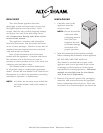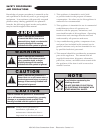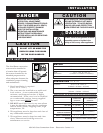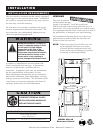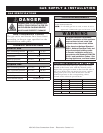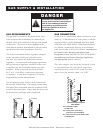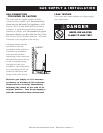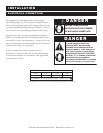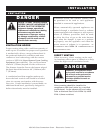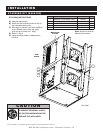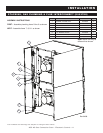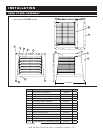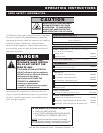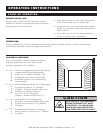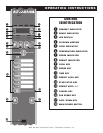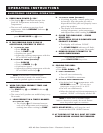
ASC-4G Gas Convection Oven - Electronic Control • 9
INSTALLATION
VENTILATION
VENTILATION HOODS
Proper venting along with a sufficient quantity of
make-up air is essential for proper oven operation.
A mechanically driven, canopy exhaust hood is
the preferred method of ventilation and must
conform to local codes along with the current
version of NFPA-96 Vapor Removal from Cooking
Equipment (latest edition). The oven hood must
extend 6" (152mm) beyond all sides of the oven.
The distance from the floor to the bottom edge of
the hood should be between 6'6" (1981mm) and
7' (2134mm).
A ventilation hood that supplies make-up air
down the back vertical wall should be avoided
since air currents can interfere with the oven
flue exits. If such installation is unavoidable, an
additional draft hood, specifically designed to
deflect downdrafts, must be installed.
DIRECT VENTING
When necessary, direct venting can be used
in situations where space is limited or to help
offset the high cost of ventilation hoods.
Direct venting should be installed in
compliance with local codes by a certified
professional. In the absence of local codes,
refer to National Fuel Code NFPA 54, ANSI
Z223.1 (latest revision).
DANGER
FAILURE TO VENT THIS APPLIANCE
PROPERLY MAY BE HAZARDOUS TO
THE HEALTH OF THE OPERATOR.
Equipment damage, operational
problems and unsatisfactory baking
performance may also be the
consequence of improper venting.
Any damage sustained by a failure
to properly vent this oven are not
covered under warranty.
DANGER
Installation, air adjustment and/or
service work must be in accordance
with all local codes and must be
performed by a certifi ed service
technician qualifi ed to work on
gas appliances.
Ventilation hoods and exhaust systems shall
be permitted to be used to vent appliances
installed in commercial applications.
Where automatically operated appliances are
vented through a ventilation hood or exhaust
system equipped with a damper or with a power
means of exhaust, provisions shall be made
to allow the flow of gas to the main burners
only when the damper is open to a position
to properly vent the appliance and when the
power means of exhaust is in operation.
IN
ACCORDANCE WITH NFPA 54 COMMONWEALTH OF
MASSACHUSETTS ONLY.



